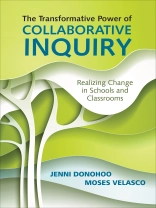Foster reflective teacher leadership and make real change happen!
Teachers are powerful change agents in the on-going process of school improvement. This insightful, must-read guide helps school leaders shape the development of a sustainable professional learning culture. Practical suggestions and in-depth research shed light on your path as you explore the benefits and challenges of adopting authentic teacher collaboration across schools and districts. A follow-up to Jenni Donohoo’s best-selling Collaborative Inquiry for Educators: A Facilitator′s Guide to School Improvement, this book will quickly move you from theory to practice. Learn valuable lessons from leaders’ experiences in the field and discover:
- A rationale and framework for engaging in inquiry
- The vital conditions needed to ensure systemwide collaboration
- Common pitfalls and the four stages of school improvement
Included are Cardwork Strategies with explicit actions and phrases to improve professional practice. Use this insightful guide to develop teacher leaders who lead and learn productively!
‘The concept of collaborative inquiry is increasingly bandied about these days with little precision. In one fell swoop, Donohoo and Velasco change all that with this succinct, hard hitting, complete, powerful, and, above all, accessible book on collaborative inquiry.’
—Michael Fullan, Professor Emeritus
OISE/University of Toronto
‘Donohoo and Velasco guide readers through an inquiry process that can strengthen every professional learning community. They provide the ‘how’ to teacher collaboration and shine light on the path that will get us all there.’
—Douglas Fisher, Professor
San Diego State University
Tabella dei contenuti
Acknowledgments
About the Authors
List of Figures, Tables, and Resources
Preface
Part One: Collaborative Inquiry: A Transformative Professional Learning Design
Chapter 1. Teacher Driven Improvement
Addressing Adaptive Challenges
A Collaborative Inquiry Framework
What it is and What it is Not
What do the Experts Say?
Moving Collaborative Inquiry from Theory to Practice
Chapter 2. Bringing Collaborative Inquiry to Scale
Coburn’s (2003) Redefinition of Scale
Conditions Necessary to Bring Collaborative Inquiry to Scale
Part Two: Strengthening the Power: Realizing Change in Schools and Classrooms
Chapter 3. Determining and Maintaining Focus
Establishing a Needs Based Focus
Formulating an Inquiry Question
Developing a Robust Theory of Action
Chapter 4. Provoking Thinking to Assess Impact
Building Appreciation for and Capacity to Use a Variety of Assessment Data
Teacher Learning Through the Collaborative Analysis of Student Work
Determining Next Best Move
Reconciling Discrepancies: Theories of Action
Chapter 5. Shaping the Development of a Professional Learning Culture
Shifting from Professional Development to Professional Learning
Building Quality Professional Relationships
Improving Collaboration
Expanding the Reach of Learning
Resources
References
Circa l’autore
Jenni Donohoo is the director of Praxis-Engaging Ideas, Inc and a project manager for the Council of Ontario Directors of Education (CODE). Jenni has a Ph D in Educational Studies and Supervisory Officer Qualifications. Jenni is a former classroom teacher and currently works with system, school leaders, and teachers around the world to support high quality professional learning. She has authored many peer-reviewed publications and three best-selling books, including Collaborative Inquiry for Educators, The Transformative Power of Collaborative Inquiry (with Moses Velasco), and Collective Efficacy: How Educators’ Beliefs Impact Student Learning. Jenni’s areas of expertise include collective efficacy, metacognition, adolescent literacy, and facilitating collaborative learning structures.












